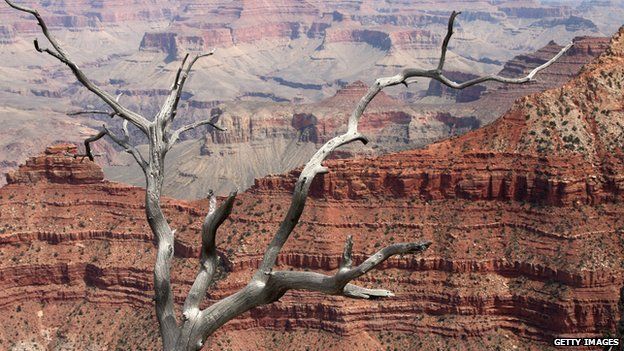Could this be the end of the Grand Canyon?
- Published
- comments

The Los Angeles Times's Julie Cart reported on Sunday of plans to build "restaurants, hotels and shops" on Navajo Indian land adjacent to the eastern portion of the Grand Canyon.
The 420-acre Grand Canyon Escalade proposal would also feature an eight-person gondola that would take tourists on a 10-minute ride to the canyon floor, she writes, "where they would stroll along an elevated riverside walkway to a restaurant at the confluence of the Colorado and Little Colorado rivers".
The canyon, called one of the seven natural wonders of the world, attracts more than 5 million visitors annually. Confluence Partners, the company behind the proposal, estimates the development could draw as many as 3 million visitors.
Prospects for this new construction have officials from the US Park Service worried that the project - located two miles from the park - may have an adverse impact on the area's scenic vistas.
"They are serious threats to the future of the park," Grand Canyon Superintendent Dave Uberuaga tells the Times. "When you have that size and scope of potential development that close to the park, it will impact our visitor experience."
The Escalade project developer, R Lamar Whitmer, counters that the construction would enhance a Grand Canyon visit, as the gondola ride would allow visitors to see the park from a different perspective:
The park service offers nothing more than "a drive-by wilderness experience," Whitmer says. "The average person can't ride a mule to the bottom of the canyon. We want them to feel the canyon from the bottom."
Several members of Confluence Partners are members of the Navajo tribe. The group also consulted Navajo elders while formulating the plans.
The development will bring in new revenue for the Navajo people, they wrote in a letter to the Associated Press, as well "create jobs for young people and bring them closer to home".
Critics have been quick to voice concern that "the Grand Canyon is doomed", as one headline put it.
Gawker's Hamilton Nolan writes:
When blessed with one of the most moving natural vistas on the face of the earth, the entrepreneurial heroes of America can be relied upon to do the right thing: build a bunch of crap around it to ruin the view. For $$$!
In a letter to the Navajo Times, Lupton, Arizona resident Janene Yazzie said the Escalade gondola will scar the wall of the canyon.
"Escalade is a graffiti-like profanity that will mar a sacred place, sacred not just to us, but to America and much of the world," she writes.
"People come to see the Grand Canyon for what it is," she continues. "They can go to Las Vegas for the profane. Escalade would cheapen the canyon's grandeur."
Carolyn Hopper writes in the High Country News that for those taking a rafting trip down the Colorado River, the proposed complex would interrupt the natural beauty of the surroundings.
"At Mile 62, several days into a river trip, it would be like encountering Las Vegas-style entertainment and crowds of people," she says.
Members of the neighbouring Hopi tribe have also raised concerns about the project. They consider the land around the confluence of the Colorado and Little Colorado rivers to be sacred.
"The solace and relationship with the environment as you're doing these religious ceremonies requires a lot of emotional well-being to feel good about it. I feel that that is what is going to be taken away," Hopi Cultural Preservation Office director Leigh Kuwanwisiwma tells Indian Country Today.
The developers, on the other hand, say the proposed area would help tribe members "monitor and protect sacred sites that will alleviate desecration of sites currently made by river rafters and hikers in the Canyon".
This is not the first time that a Grand Canyon development has been the source of controversy. In 2007 the Hualapai tribe opened a glass skywalk that allows visitors to venture over the western portion of the landmark.
Mr Whitmar was also involved in that project.
The next step for the Grand Canyon Escalade is a vote by the Navajo tribal government. If it gives the green light, US government officials have said they will provide their official response. A legal dispute could be in the offing, based on where federal jurisdiction around the Colorado ends and Navajo land begins.
The developers argue that they can build anywhere above the river's high water mark, while the government asserts that they block development up to a quarter mile from either bank.
So whether a trip to the canyon floor is a day's hike or a few minutes' ride away could end up decided the way most controversial land-use disputes are these days - by a judge.